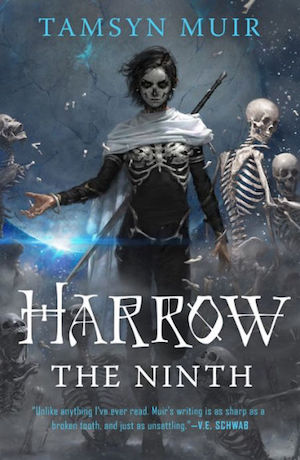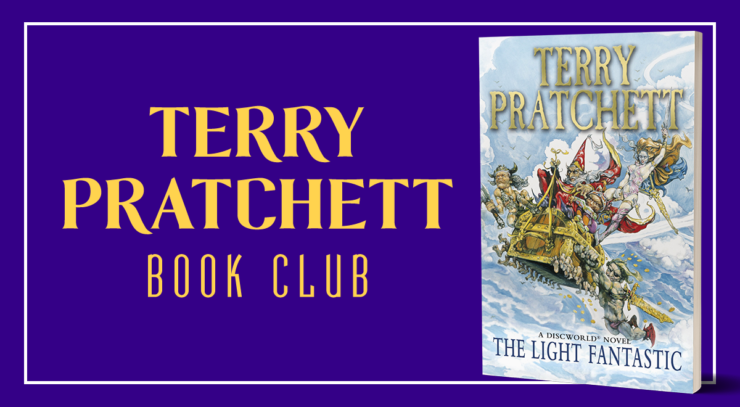If the entire world was about to be engulfed in flame, the Terry Pratchett Book Club would probably go take a long walk by a river and feed some ducks. It’s part three of The Light Fantastic.
Summary
Herrena and her crew have kidnapped Rincewind’s friends but, on noticing they’re being trailed by trolls, opt to camp in a cave for the night where they light a fire to keep the trolls away. Unfortunately, this cave turns out to be Old Grandad’s mouth. Rincewind tries to warn them of this as two of Herrena’s henchman are trying to pry open the Luggage, who reveals a great deal of gold to them. When one of the henchman tries to remove said gold, the Luggage eats him, prompting the other henchman to release the prisoners as the group flees. Old Grandad tries to smash Rincewind with a fist, but the sun comes up and the trolls all turn to stone. Cohen saw what the Luggage did to the henchman and starts a fight with it, trying to figure out what its deal is. Twoflower admits that he bought the Luggage in a strange shop that he could never find again from a very strange old man.
Cohen tells them to pick up the fragments of diamond that the Luggage broke (the troll’s teeth) to get them out of the cave. The wizard has a different thought and tells Twoflower that he thinks they should leave Cohen and Bethan behind once they find their horses. They start off, but Twoflower doesn’t like it and turns around to fetch Cohen and Bethan. Rincewind tells the Luggage that he will not go after the tourist—they stare each other down until Rincewind relents, but then they both get captured by Herrena and her gang. They start their trek to the river, but the Luggage is stalking them, stoking paranoia. They arrive at the river’s edge and summon the ferry—the ferryman is Cohen. A fight breaks out, Herrena almost kills Cohen when his back seizes, but Bethan shows up and knocks her on the head with a heavy piece of wood. They win the fight and get away, and Cohen and Bethan inform the other two that they’re getting married.
Buy the Book


Harrow the Ninth
They head into a city that everyone is in the midst of leaving—people are heading into the mountains as the star approaches. Most of the doors in the city have the star painted them. Cohen heads off to attend to personal business (he is getting dentures made and paying for them with the Old Grandad’s broken diamond tooth), while the other three head into the religious quarter and find red stars painted over all the temples, and a preacher who is talking about the end. Death shows up next to Rincewind and admits that he doesn’t appreciate this display all that much. Then a man approaches Rincewind saying that he looks like a wizard, and that they killed all the wizards in their city because the red star took their magic from them. Rincewind tries to warn him off, but the man is insistent, leading Rincewind’s body to react of its own accord to protect the Octavo spell—he makes the man vanish with magic, and it sends him into a sort of shock. A mob descends upon them, but the group suddenly find themselves in front of a shop.
Cohen is in the process of getting his dentures made when the dwarfish jeweler is harassed by fellow denizens of the city—he is of a “magic race” and these people have decided that the Disc can be saved from the red star if they turn away from magic. Cohen comes to the jeweler’s defense, and the dwarf (named Lackjaw) packs up his kit and elects to leave with him for the sake of protection. They come across a group burning books, then run into an inn where Cohen finds the Luggage tucked into a corner. Lackjaw suspects senility when Cohen tells him that he expects the box to move, but then the Luggage breaks through a wall.
Bethan, Twoflower, and Rincewind have ended up in an odd shop, stocked with just about everything, though it has no doors—it’s a starship, or wandering shop. Rincewind keeps saying things about the incoming star that he doesn’t remember, the Octavo speaking through him. He asks if the shop can take them back to Ankh-Morpork. As they’re on their way, the shopkeeper explains that he ended up the custodian of a wandering shop when he upset a wizard by not having something in stock that the fellow wanted, then offering to order it in and laughing when the wizard came back at the wrong time, not knowing it was an early closing day.
Book Club Chat
So… this section.
Good satire is often like this, where you going along and everything seems lighthearted and jovial, and the author is ribbing us about things we see on a day to day basis, but it’s all in good fun. And then we get hit with a broader commentary that really turns the screws, so to speak. And it’s far less funny. This is the first time it really all comes together like that in a Discworld book, starting with how denizens are reacting to this crisis, and this specific group of doomsday-zealots who go all-in on the idea that there must be a reason for this approaching star, and latching onto the first thing they don’t all have in common—in this case, it’s magic.
For me, it starts with the bit where they’re listening to the preacher talk about the End of the World, and Rincewind is bothered by the man’s voice for a specific reason, that reason being: “The voice didn’t believe in gods, which in Rincewind’s book was fair enough, but it didn’t believe in people either.” Which… it’s like a freaking laser beam homing in on the thing. That thing. The thing that always bugs me the most when I hear a subway preacher shouting at passengers about The End, the thing that’s actually upsetting me and I never think to put into words. And there it is, sitting in Rincewind’s head. Being bothered by that lack of faith in people.
Almost immediately after that, Death is talking to Rincewind about how he doesn’t much like this; he can understand what he does on a personal scale, when life ceases, but he can’t really get behind the “death-of-the-mind.” And… well, that’s really exactly it, isn’t it? Having faith as a guide for life is fine, if you’re wanting a bit of a roadmap, a way to contextualize. But that’s not what they’re watching in this moment. This isn’t being used as a helpful guide—it’s the ravings of someone who wants to mold fear into a cudgel.
It gets even rougher once we follow Cohen to the jeweler where he’s getting his dentures made, because the jeweler is dwarvish. And the jeweler talks about the groundswell of violence around this group who fear the red star, about how “stars have never hurt me, I wish I could say the same about people.” Because he’s from a magical race, or at least, that’s how his neighbors see him. And right now they’ve decided they don’t like magic, and he’s prepared for them to come beat him up, because according to him, that’s how it goes.
And then I think about how many fantasy authors have used dwarfs or goblins as a sort of stand-in for Jewish people (sometimes unthinkingly, but the trope exists), how often the attributes they assign to them are all about greed and wealth and hoarding, and how the narrative describes them as physically unpleasant, and then I look at how Pratchett chose to use this dwarf from my own perspective as a person of Jewish descent. How he consciously chose to frame him, his abuse at the hands of these zealots, and how he eschews the usual stereotypes—he’s not greedy, this is just his job, for one—and shows what this situation is really like from his side of things. And I try to think of another moment in fantasy literature where I’ve encountered its like… but at the moment I’m coming up empty.
There’s book burning and mob mentality and all of our protagonists have to run away and find cover, and all of this is just a scathing picture of what religious zealotry does to people, how it warps them and destroys communities. Pratchett didn’t have to get into this aspect of things, but he saw the opening, and it makes this book a very different sort of story than it might have been. And I have to give him credit for that.
Asides and little thoughts:
- Herrena wants her bars to have good cocktails. As a person who does like a good ale on occasion, I’m still on her side. Small glasses and brandied cherries, or it’s a waste of my time.
- This exchange:
“I’m off to the mountains.”
“That’ll help, will it?” said Rincewind doubtfully.
“No, but the view will be better.”That’s a pandemic mood 2020, if I ever saw one. (I would like to go to the mountains. Please.)
- “Do not peddle in the affairs of wizards[…]” I mean, if you’re going to give a shoutout to Lord of the Rings somewhere, it might as well be here, right?
Pratchettisms:
The sunlight roared silently across the land like surf. Here and there, where the magic field was slightly weaker, tongues of morning raced ahead of the day, leaving isolated islands of night that contracted and vanished as the bright ocean flowed onward.
The Luggage said nothing, but louder this time.
Wizards, like cats, can see Death.
The room was full of shelves, and the shelves were full of everything. Things that couldn’t be accommodated on them hung in bunches from the dark and shadowy ceiling; boxes and sacks of everything spilled onto the floor.
Torn though her dress was, disarrayed though her hair was, she became for a moment the symbol of every woman who has caught a man with his thumb on the scales of life.
Next week we’re finishing the book, folx! See you then!










